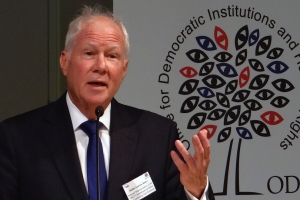Greater efforts, co-operation needed to ensure security of Jewish communities, say participants at OSCE conference in Berlin
Violent attacks and threats motivated by anti-Semitism affect the day-to-day lives of Jewish communities all across the OSCE region, and these communities are in need of protection from these threats and the harmful impact they have on their religious and cultural activities and on their human rights, said participants at an expert OSCE conference in Berlin.

Rabbi Andrew Baker, the Personal Representative of the OSCE Chairperson-in-Office on Combating Anti-Semitism, speaking at an expert conference on the security needs of Jewish communities in the OSCE region, Berlin, 13 June 2013.
The conference, organized jointly by the Ukrainian OSCE Chairmanship and by the OSCE Office for Democratic Institutions and Human Rights (ODIHR), brought together representatives from the governments of more than 20 OSCE participating States, as well as from Jewish communities and civil society.
In an address sent to the event, the OSCE Chairperson-in-Office Ukrainian Foreign Minister Leonid Kozhara, called for concerted efforts towards building mutual respect and understanding in the OSCE region.
“We should address anti-Semitism as a real security threat in the OSCE region,” Kozhara said. “Violent anti-Semitic incidents targeting Jewish and non-Jewish individuals, their property, and Jewish communal institutions, such as synagogues, cannot be tolerated anymore; they should be prevented in advance and by all means.”
Rabbi Andrew Baker, the Personal Representative of the OSCE Chairperson-in-Office on Combating Anti-Semitism, told the conference that all states had a responsibility to ensure the security of Jewish communities.
“Governments have an obligation to protect their citizens and to permit the free exercise of religion, but these essential commitments are now being challenged in a growing number of countries where Jewish communities feel besieged,” he said. “Some are forced to make Hobbesian choices between using limited resources for religious and educational programmes or to divert that money to hire more security guards or build needed security barriers.”
Hans Peter Friedrich, the German Interior Minister said: “The fight against anti-Semitism is a fight for democracy and tolerance as a core value. All parts of society have to be included in these efforts if anti-Semitism is to be successfully confronted and eliminated.” He emphasized that educational initiatives in this area have been strongly promoted in Germany.
The vital role of co-operation among government authorities, civil society and religious communities in addressing security threats was an issue stressed by most of the conference’s participants.
“We need to create awareness of the issue among government representatives in Europe in order to improve the communication and sharing of information between Jewish communities and local authorities, and to make it clear that, without security, Jewish communities cannot survive,” said Ariel Muzicant, the Vice-President for Security and Crisis Management of the European Jewish Congress.
Floriane Hohenberg, the Head of ODIHR’s Tolerance and Non-Discrimination Department, stressed that such contacts, as well as training for law enforcement officers in dealing with anti-Semitic crimes had to be developed at the local and community levels.
“There has to be confidence among Jewish communities that there is a commitment to providing for their security,” Hohenberg said. “Training to ensure that the police have the necessary skills and understanding to help prevent anti-Semitic hate crimes, and to properly investigate them when they do occur, is central to creating greater trust and co-operation at the community level.”
Source: Organization for Security and Co-operation in Europe
- 444 reads
Human Rights
Ringing FOWPAL’s Peace Bell for the World:Nobel Peace Prize Laureates’ Visions and Actions

Protecting the World’s Cultural Diversity for a Sustainable Future

The Peace Bell Resonates at the 27th Eurasian Economic Summit

Declaration of World Day of the Power of Hope Endorsed by People in 158 Nations

Puppet Show I International Friendship Day 2020

